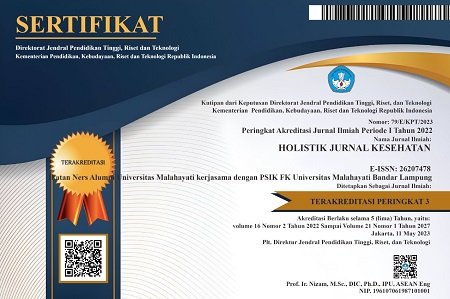Korelasi stres subjektif dan strategi koping mahasiswa keperawatan di masa pandemi Covid-19
Abstract
Background: Stress is common among nursing students, especially those in their final year. If it is not handled properly, in the long term it will disrupt physical health and the clinical learning process will be hampered. This condition is exacerbated by the pandemic situation which increases the risk of students contracting infectious diseases during clinical practice. Various factors are also potentially related to nursing students' coping strategies.
Purpose: To examine the correlation between stress and nursing students' coping strategies during the Covid-19 pandemic, along with the factors related to it.
Method: A descriptive analytical design with a cross-sectional approach was used in this study involving 104 nursing students. The measuring instruments used are Depression Anxiety Stress Scale-42 (DASS-42) and Coping Strategies Inventory-Short Form (CSI-SF). Statistical tests use Independent T-Test, One-way ANOVA, and Pearson Correlation.
Results: There was a difference in the average score of the coping strategy component involvement (t=-3.01; p=0.01) and disinvolvement (t=-0.26; p=0.01) based on the use of personal protective equipment (PPE). There was a difference in scores for the components of engagement coping strategies based on knowledge and prevention about Covid-19 (t=-2.45; p=0.02). There was a significant correlation between age and disengagement (r=-0.32; p<0.01) and emotion-focused disengagement (r=-0.41; p<0.001). Stress was significantly correlated with the emotion-focused component of disengagement (r=0.33; p<0.01).
Conclusion: Students who are older, who use PPE have sufficient knowledge and prevention regarding Covid-19, and who experience more severe stress tend to use better coping strategies.
Suggestion: Students should be able to manage stress and use positive coping strategies. Assessment of the student's psychological condition can be considered to continue during the study. Future research can develop interventions for the use of appropriate coping strategies in nursing students.
Keywords: Coping Strategy; Nursing Students; Subjective Stress.
Pendahuluan: Stres umum didapati pada mahasiswa keperawatan, khususnya yang berada di tahun terakhir. Apabila tidak tertangani dengan baik, dalam jangka panjang maka akan mengganggu kesehatan fisik dan proses pembelajaran klinik menjadi terhambat. Kondisi ini diperparah dengan keadaan pandemi yang meningkatan resiko mahasiswa tertular penyakit infeksius selama praktik klinik. Berbagai faktor juga berpotensi berhubungan dengan strategi koping mahasiswa keperawatan.
Tujuan: Untuk menguji korelasi antara stres dan strategi koping mahasiswa keperawatan di masa pandemi Covid-19, beserta faktor-faktor yang berhubungan dengannya.
Metode: Desain deskriptif analitik dengan pendekatan cross-sectional digunakan dalam penelitian ini yang melibatkan 104 mahasiswa keperawatan. Alat ukur yang digunakan yaitu Depression Anxiety Stres Scale-42 (DASS-42) dan Coping Strategies Inventory-Short Form (CSI-SF). Uji statistik menggunakan Independent T-Test, One-way ANOVA, serta Korelasi Pearson.
Hasil: Terdapat perbedaan skor rata-rata komponen strategi koping keterlibatan (t=-3.01; p=0.01) dan ketidakterlibatan (t=-0.26; p=0.01) berdasarkan penggunaan alat pelindung diri (APD). Ada perbedaan skor komponen strategi koping keterlibatan berdasarkan pengetahuan dan pencegahan tentang Covid-19 (t=-2.45; p=0.02). Ada korelasi yang signifikan antara umur dengan ketidakterlibatan (r=-0.32; p<0.01) dan ketidakterlibatan berfokus emosi (r=-0.41; p<0.001). Stres berkorelasi signifikan dengan komponen ketidakterlibatan berfokus emosi (r=0.33; p<0.01).
Simpulan: Mahasiswa yang berusia lebih tua, pengguna APD memiliki pengetahuan dan pencegahan terkait Covid-19 yang cukup, serta mengalami stres yang lebih parah cenderung menggunakan strategi koping yang lebih baik.
Saran: Mahasiswa agar dapat mengelola stres dan menggunakan strategi koping yang positif. Pengkajian terhadap kondisi psikologis mahasiswa dapat dipertimbangkan untuk terus dilakukan selama studi. Penelitian selanjutnya dapat mengembangkan intervensi terhadap penggunaan strategi koping yang tepat pada mahasiswa keperawatan.
Kata Kunci: Mahasiswa Keperawatan; Strategi Koping; Stres Subjektif.
Keywords
References
Agustiningsih, N. (2019). Gambaran Stress Akademik dan Strategi Koping Pada Mahasiswa Keperawatan. Jurnal Ners Dan Kebidanan (Journal of Ners and Midwifery), 6(2), 241-250.
Angelica, H., & Tambunan, E. H. (2021). Stres dan koping mahasiswa keperawatan selama pembelajaran daring di masa pandemik Covid-19. Jurnal Ilmiah Keperawatan Imelda, 7(1), 28-34.
Apriliana, D. N. (2021). Strategi Koping dan Stres Akademik Mahasiswa Dalam Melaksanakan Kuliah Daring Pada Masa Pandemi Covid-19. J Imiah Psikol, 9(1), 89-96.
Ariviana, I. S., Wuryaningsih, E. W., & Kurniyawan, E. H. (2021). Tingkat stres, ansietas, dan depresi mahasiswa profesi ners di masa pandemi COVID-19. Jurnal Ilmu Keperawatan Jiwa, 4(4), 741-752.
Barisone, M., Ghirotto, L., Busca, E., Crescitelli, M. E. D., Casalino, M., Chilin, G., ... & Dal Molin, A. (2022). Nursing students’ clinical placement experiences during the Covid-19 pandemic: A phenomenological study. Nurse Education in Practice, 59, 103297.
Dorgham, S. (2020). The Relationship among Emotional Intelligence, Stress and Coping Strategies for Nursing Students.
Ersin, F., & Kartal, M. (2021). The determination of the perceived stress levels and health‐protective behaviors of nursing students during the COVID‐19 pandemic. Perspectives in psychiatric care, 57(2), 929.
Eweida, R. S., Rashwan, Z. I., Desoky, G. M., & Khonji, L. M. (2020). Mental strain and changes in psychological health hub among intern-nursing students at pediatric and medical-surgical units amid ambience of COVID-19 pandemic: A comprehensive survey. Nurse education in practice, 49, 102915.
Fernández, I. A. M., Moreno, S. C., Díaz, L. C., Gallegos-Torres, R. M., Fernández, J. A. M., & Martínez, E. K. H. (2021). Fear, stress, and knowledge regarding COVID-19 in nursing students and recent graduates in Mexico. Investigacion y Educacion En Enfermeria, 39(1), 1–12.
Fitriasari, A., Septianingrum, Y., Budury, S., & Khamida, K. (2020). Online learning stress relates to student coping strategies during the COVID-19 Pandemic. Jurnal Keperawatan, 12(4), 985-992.
Hamadi, H. Y., Zakari, N. M., Jibreel, E., Al Nami, F. N., Smida, J. A., & Ben Haddad, H. H. (2021). Stress and coping strategies among nursing students in clinical practice during COVID-19. Nursing Reports, 11(3), 629-639.
Hidayah, R., Trisnayanti, A., & Rachmawati, S. D. (2021). Hubungan Antara Tipe Kepribadian Dengan Tingkat Stres Pada Mahasiswa Profesi Ners. Jurnal Kesehatan Mesencephalon, 6(2).
Lovibond, P. F., & Lovibond, S. H. (1995). The structure of negative emotional states: Comparison of the Depression Anxiety Stress Scales (DASS) with the Beck Depression and Anxiety Inventories. Behaviour research and therapy, 33(3), 335-343.
Mahutri, L., Eoh, J. A. N., Mooy, M. N. S., Paula, V., & Silitonga, E. (2022). Gambaran Mekanisme Koping Stres pada Mahasiswa Profesi Keperawatan dii Satu Universitas Swasta Indonesia Barat. Jurnal Keperawatan, 14(2), 93-100.
Maramis, J. R., & Mokalu, V. V. (2021). Hubungan kecerdasan emosional dengan mekanisme koping pada mahasiswa tingkat akhir profesi ners Universitas Klabat. Klabat Journal of Nursing, 3(2), 36–42.
Nurhidayati, T. (2014). Tingkat stres mahasiswa profesi ners stase komunitas Universitas Muhammadiyah Semarang. FIKkeS, 7(1).
Pragholapati, A., & Ulfitri, W. (2019). Gambaran Mekanisme Coping pada Mahasiswa Program Studi Sarjana Keperawatan Tingkat IV yang Sedang Menghadapi Tugas Akhir di Sekolah Tinggi Ilmu Kesehatan X Bandung. Humanitas (Jurnal Psikologi), 3(2), 115-126.
Sarfika, R. (2019). Stress Pada Mahasiswa Keperawatan Dan Strategi Koping Yang Digunakan. NERS Jurnal Keperawatan, 14(2), 81-91.
Sawitri, A. R., & Widiasavitri, P. N. (2021). Strategi coping mahasiswa yang sedang menyusun skripsi di tengah pandemi COVID. Jurnal Psikologi Udayana, 8(1), 78-85.
Shanafelt, T., Ripp, J., & Trockel, M. (2020). Understanding and addressing sources of anxiety among health care professionals during the COVID-19 pandemic. JAMA, 323(21), 2133–2134.
Singh, N., & Kohli, C. (2015). Stress reaction and coping strategies among nursing students in Delhi. Asian Journal of Nursing Education and Research, 5(2), 274-278.
Sinurat, S., Simbolon, P., & Zega, B. A. (2022). Spiritualitas dengan Stres Mahasiswa yang Melakukan Praktik Keperawatan di Masa Pandemi Covid-19. Jurnal Kesehatan Perintis, 9(1), 39-46.
World Health Organization. (2022). Covid-19 pandemic triggers 25% increase in prevalence of anxiety and depression worldwide. Diakses dari: https://www.who.int/news/item/02-03-2022-covid-19-pandemic-triggers-25-increase-in-prevalence-of-anxiety-and-depression-worldwide
Yasmin, S., Hussain, M., Parveen, K., & Gilani, S. A. (2018). Coping strategies of nursing student against academic and clinical stress at public sector Lahore. Int. J. Soc. Sc. Manage, 5(3), 209-218.
Yusup, R. M., & Musharyanti, L. (2021). Kesehatan mental dan strategi koping mahasiswa keperawatan pada masa pandemi covid-19. Journal of Telenursing (JOTING), 3(2), 636-650.
DOI: https://doi.org/10.33024/hjk.v17i10.13772
Refbacks
- There are currently no refbacks.
Copyright (c) 2024 Holistik Jurnal Kesehatan

This work is licensed under a Creative Commons Attribution-NonCommercial 4.0 International License.














